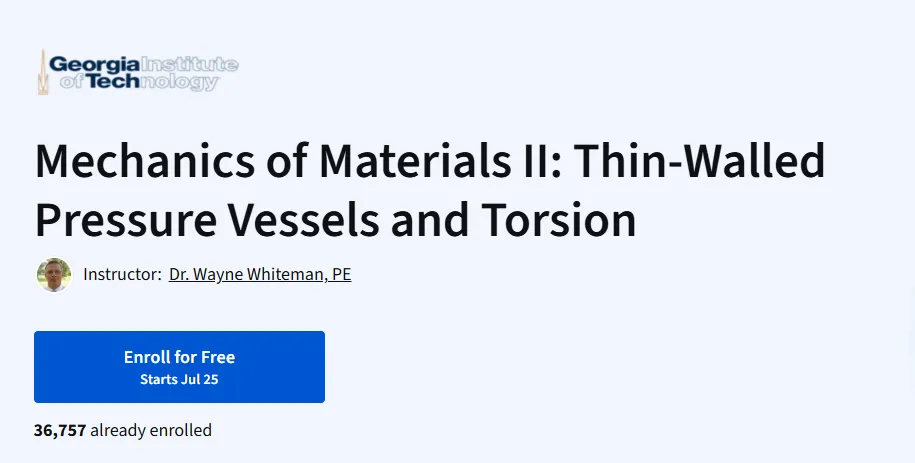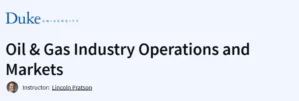What will you learn in Mechanics of Materials II: Thin-Walled Pressure Vessels and Torsion Course
Master the fundamental laws of momentum, energy, and their conservation in physical systems.
Apply Newton’s laws and conservation principles to solve real-world motion problems.
Analyze systems involving collisions, explosions, and oscillations.
Gain skills needed for advanced study in physics and engineering mechanics.
Program Overview
Module 1: Impulse and Momentum
⏱️ 1 week
Topics: Linear momentum, impulse-momentum theorem, collisions.
Hands-on: Problem sets involving momentum calculations and conceptual quizzes.
Module 2: Conservation of Momentum
⏱️ 1 week
Topics: Conservation principles, elastic vs inelastic collisions.
Hands-on: Visual examples and numerical problem-solving.
Module 3: Work and Energy
⏱️ 1 week
Topics: Work-energy theorem, kinetic energy, power.
Hands-on: Practice using work-energy relations to analyze systems.
Module 4: Potential Energy and Energy Conservation
⏱️ 1 week
Topics: Gravitational and spring potential energy, total mechanical energy.
Hands-on: Interactive simulations and exercises with energy graphs.
Module 5: Systems and Oscillations
⏱️ 1 week
Topics: Center of mass, systems of particles, simple harmonic motion.
Hands-on: Conceptual and computational problem sets on oscillating systems.
Get certificate
Job Outlook
Foundational course for physics, engineering, and applied mathematics careers.
Essential knowledge for mechanical, aerospace, civil, and robotics engineers.
Prepares students for advanced university courses and entrance exams.
Career potential: Research, engineering, data modeling, teaching, and more.
Specification: Mechanics of Materials II: Thin-Walled Pressure Vessels and Torsion
|
FAQs
- A basic understanding of mechanics of materials (from an introductory course) is recommended.
- Familiarity with stress, strain, and basic material properties helps but is not mandatory.
- The course builds on foundational concepts to cover thin-walled pressure vessels and torsion.
- Step-by-step explanations simplify complex mechanics principles.
- Learners can strengthen their understanding of advanced material mechanics concepts.
- The course covers stress analysis for cylindrical and spherical pressure vessels.
- Learners study hoop stress, longitudinal stress, and radial stress distribution.
- Examples demonstrate real-world engineering scenarios.
- Step-by-step exercises provide guidance on calculations and design considerations.
- Skills gained are directly applicable to mechanical and structural engineering projects.
- Learners explore torsion theory for circular and non-circular shafts.
- Concepts like angle of twist, shear stress distribution, and polar moment of inertia are introduced.
- Practical examples show torsion in rotating machinery and structural components.
- Step-by-step calculations and diagrams make the concepts easier to grasp.
- Skills are relevant for mechanical design, materials engineering, and structural analysis.
- Understanding stress and torsion analysis is critical for mechanical and structural engineering roles.
- Skills improve employability in industries like automotive, aerospace, and manufacturing.
- Hands-on problem-solving demonstrates practical ability to potential employers.
- Knowledge of design and safety considerations enhances professional credibility.
- Completion shows readiness to contribute to engineering design, analysis, and research projects.
- Estimated completion is around 3–5 weeks at a part-time pace.
- Weekly effort of 4–6 hours is generally sufficient for lectures, problem-solving, and exercises.
- Regular practice with stress and torsion calculations reinforces learning.
- Revisiting exercises or attempting additional design problems may require extra time.
- Consistent engagement ensures learners develop both conceptual understanding and practical skills in advanced mechanics of materials.





